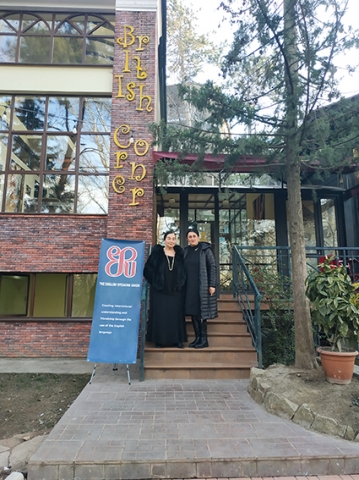English-Speaking Union Awards Sachkhere Teacher as Runner-Up in Global Excellence in Oracy
The English-Speaking Union (ESU), an international membership organization and educational charity founded in 1918, has been promoting international friendship and understanding through use of the English language for more than 100 years. Based in London, the ESU is a charity established by a Royal Charter, with Her Majesty the Queen as Patron. The former President of the ESU, His Royal Highness the Duke of Edinburgh (1957 2012) was succeeded by HRH Princess Anne. The organization has a network in 64 countries worldwide. Georgia joined the given list in 1998, and ESU Georgia was officially founded in 2000 by Marina Tsitsishvili, who was awarded an honorary MBE in the Queen’s 2016 New Year Honors List for services to UK-Georgian cultural and educational relations. With the support of ESU Georgia, Tsitsishvili launched the British Corner, an English Language Center.
The ESU llaunched the very first International Teacher Award, which aimed to recognize global excellence in oracy (the development of speaking and listening skills) teaching.
With dedication and hard work, a Georgian teacher from a small town of Sachkhere, Maia Tkemaladze, nabbed the runner-up spot in this incredibly important contest.
GEORGIA TODAY went to meet her.
Why did you become an English language teacher?
I made the decision to become an English language teacher at a very young age, when I was in the 5th grade. I’d just started learning English and I would say my teacher contributed a lot to my choice of profession. The way she explained and delivered the material was so interesting and motivating that I decided to try it myself.
I also thought about becoming an actress, but I ultimately followed my childhood dream and kept acting and directing as tools to help my students learn through work on plays and theater shows.
What challenges did you face when studying English and how did you manage to deal with them?
It was certainly very complicated to learn a foreign language back in my day, as within the borders of the USSR we had no communication with foreigners at all. The learning environment was also difficult, as the process was based on memorization and there were few chances for self-expression. Even though I had the highest grades at school, I could barely understand even the names of foreigners at our first meetings.
During my studies at university, I was lucky to have a tutor from Britain who helped me to ameliorate my level of English. The first ever training in Georgia regarding integrating debates in the classroom, in 1998, was a turning point in my life and profession. After the training, I totally changed my approach towards teaching English and decided to make the learning environment much easier and more interesting for my students so as to prevent their facing the challenges I had.
Why did you decide to go back to Sachkhere after graduating in Tbilisi?
I did it for my family, who live there. It was of paramount importance for me to live close to them. The destructive earthquake that happened there in 1991 was another catalyst of my choice. Even though I had an offer to continue my studies in Tbilisi, I felt the need to help my hometown and its residents. I wanted the children from Sachkhere to be able to learn English and develop. The classes were given in vans instead of classrooms for a decade. I have always had a strong desire to somehow help the people of the small town.
What issues remain in the teaching process?
Even though there is access to a lot of information through the internet, and there have been a number of reforms and policies implemented in the sphere of education, there are still a number of important issues remaining in the rural areas of Georgia. Children are somehow isolated in small towns and villages and have no communication with their foreign counterparts. The technologies and school equipment are not well enough developed, a fact that hinders the process of acquiring English. And this is not a problem only for Sachkhere and the school I work in: it is a problem in most Georgian rural areas.
What approaches do you apply while teaching your students?
I always try to use interactive methodology in my classes and to involve the children in debates, discussions and games in order to boost their speaking and listening skills. I also actively use theater and stage performances in the teaching process. We have already produced four stage plays, including Romeo and Juliet and Snow White and the Seven Dwarfs.
This artistic approach has been most effective, as it also involved the work of the school’s Art teacher for the costumes and stage decorations. The rehearsals were a lot of fun for the students and participation helped them not only improve their level of English, it also helped them to develop presentation and communication skills and increase their self-esteem.
What plans do you have for the future?
Last year I was named among the 10 best teachers in the country. The financial rewards I obtain from different awards, I dedicate to my school and the development of the facilities for pupils. I am going to continue working to improve the level of English among the children of Sachkhere and will do my best to implement new and interesting methods which will make the process of studying equally engaging and entertaining.
By Ketevan Kvaratskheliya











